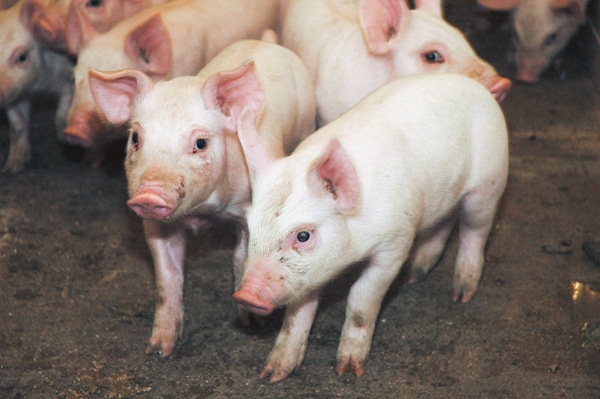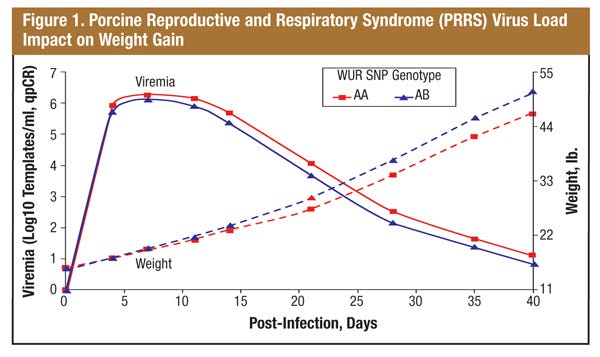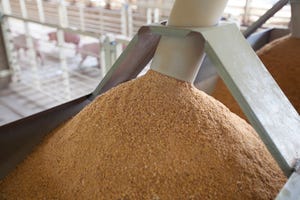In a national effort to assess the role of genetics in determining pig resistance/susceptibility to PRRS virus infection and related pathology and growth effects, the PRRS Host Genetics Consortium (PHGC) was formed. By collecting data on large numbers of PRRS virus-infected pigs, researchers aim to identify and verify important genotypes and phenotypes that predict resistance, tolerance or susceptibility to viral infection.
December 15, 2012

Infection with porcine reproductive and respiratory syndrome (PRRS) virus elicits a weak immune response in pigs that is not fully protective and that often results in persistent infection in a subset of pigs. Despite substantial research efforts, the exact components of a protective anti-PRRS virus immune response are not known, particularly as it affects viral persistence.
Earlier work has indicated that there are genetic components involved in controlling the effectiveness of pig responses to PRRS virus infection. However, in the past, these types of experiments have involved a limited number of animals using a limited number of assays.
In a national effort to assess the role of genetics in determining pig resistance/susceptibility to PRRS virus infection and related pathology and growth effects, the PRRS Host Genetics Consortium (PHGC) was formed. By collecting data on large numbers of PRRS virus-infected pigs, researchers aim to identify and verify important genotypes and phenotypes that predict resistance, tolerance or susceptibility to viral infection.
To date, 13 PRRS virus infection trials of about 200 pigs each have been performed at the biosafety level-2 facilities at Kansas State University (KSU). Weaned pigs were followed for about 42 days, post-infection, with a 1997 Type 2 PRRS virus isolate for the first nine trials. The last four trials used a more recent 2006 isolate.
Numerous samples — nine blood samples across 42 days for viral levels, immune proteins and RNA, tonsils for viral persistence and ears for DNA — were collected and stored in duplicate locations at KSU and at the USDA Agricultural Research Service Beltsville (MD) Agricultural Research Center laboratories. All data is stored on a shared database at Iowa State University (ISU) at http://www.animal
genome.org/lunney/index.php.
Using this data, genome-wide association analysis (GWAS) performed at ISU has identified that a region on swine chromosome 4 (SSC4) has major effects on virus load and weight gain following infection with the PRRS virus (Figure 1). The effect of the favorable “B” allele at a target SNP (single-nucleotide polymorphism, or snip) in this region, WUR10000125, is dominant, so pigs that have at least one copy of this allele are less susceptible to PRRS as seen by the decreased viral levels and improved weight gain for AB as compared to AA pigs.

Further work has shown that the favorable effect of this allele is present irrespective of whether it is received from the sire or dam and regardless of breed. The favorable allele is found in low frequency in the commercial Landrace, Large White, Yorkshire, Duroc and Pietrain lines that have contributed to the crossbred pigs that have been evaluated to date, and possibly in other breeds and genetic lines.
These studies have begun to identify genetic alleles that could help predict which pigs will clear PRRS virus faster and grow better following infection.
This work sets the stage for targeting the genetic region to identify the exact genes involved and the mechanism that induces the early anti-PRRS virus response. These efforts could potentially lead to new anti-PRRS virus biotherapeutics or vaccines.
The PHGC is a multi-year project funded by Pork Checkoff, USDA, universities and private companies. The consortium represents the first-of-its-kind approach to food animal infectious disease research.
Researchers: Joan K. Lunney, USDA, ARS, BARC, Beltsville, MD; Raymond (Bob) Rowland, Kansas State University; and Jack Dekkers, Iowa State University. Contact Lunney by phone (301) 504-9368 or e-mail [email protected]; Rowland by phone (785) 532-4631 or e-mail [email protected]; Dekkers by phone (515) 294-7509 or email [email protected].
You May Also Like



